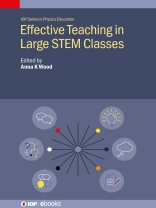This book provides an accessible and research-informed introduction to teaching large classes, aimed at teachers from across the STEM subjects, at all stages of their careers, who want to provide the most effective teaching and learning experiences for their students. A central theme throughout is that active learning is an important aspect of good-quality teaching. This is explored in detail through both practical guidance for implementing such techniques as well as through an accessible introduction to the theoretical and pedagogical issues that underpin its use, supported by case studies. The text provides an introduction for university teachers interested in using approaches such as the flipped classroom, and offers discussion on how to quantify activities within classrooms through observation tools, and what the future of teaching large classes might look like.
Key Features
- Provides a practical guide to effective teaching of large classes in STEM subjects at university level
- Takes an evidence-based approach and synthesises the theoretical and pedagogical issues that are important for teachers to understand
- Provides an overview of the literature supporting active learning approaches
- Discusses the flipped classroom, strategies for introducing interactivity into classes, and the use of technology such as electronic voting systems
- Includes the role of assessment in large classes
- Proposes a view of the future of large classes, including the role of hybrid teaching
Зміст
1 Large classes in STEM education—potential and challenges
2 Active learning in large classes
3 Practical approaches to active learning
4 Using classroom observation tools to characterize large classes
5 Authentic and inclusive (summative) assessments
6 Computer-marked assessment and concept inventories
7 Case study 1: an introductory physics course
8 Case study 2: tailored active blended learning in a foundation year chemistry module
9 Case study 3: linear algebra, University of Edinburgh
10 Case study 4: more questions than you could ever answer: personalized learning by student-posed questions during biology lectures
11 Case study 5: the learning assistant model for engaging students
12 Effective teaching in large classes; looking through and beyond the COVID-19 pandemic
Про автора
Dr Anna Wood is an education researcher at the University of Edinburgh. Her research focuses on learning in large classes in physics, and on the use of technology to support learning. She has researched, written, and run workshops about peer instruction, the use of electronic voting devices, lecture capture, and the interactions in large classes, and has developed the FILL (Framework for Interactive Learning in Lectures) tool for accurately characterising activities in lectures. Dr Wood has published widely on these topics including in Physical Review Physics Education Research, Teaching in Higher Education, and Technology, Pedagogy and Education.












